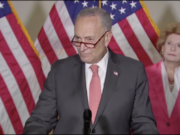In modern American politics, it seems to be taken for granted that more disclosure is good. Whether it is disclosure of candidate’s or nominee’s personal finances, disclosure of donors to citizens’ groups, or disclosure of political contributors, it seems that everyone favors disclosure. But is all disclosure always good? Is more disclosure always beneficial? Efforts to change how U.S. Senate campaigns file campaign finance reports sheds some interesting light on the topic, if we take a moment to look.
For several years now, candidates for the U.S. House of Representatives have been required by law to file their campaign finance reports electronically with the Federal Election Commission. This allows the reports to be available to the public on-line within 24 hours of the filing date. The Senate, however, has steadfastly refused to pass legislation that would require senators to do the same. Instead, senators file their reports on paper, with the Secretary of the Senate. The reports are then manually scanned into the FEC’s disclosure database. The delays public release of the reports, costs the government money, and makes for a database which has no real search feature. Even most campaign treasurers, who are responsible for the filings, don’t like it – they would prefer to file electronically. For many reasons, therefore, it would appear to make sense to have Senate campaigns file electronically. During my 5 years on the Federal Election Commission, I always supported the Commission’s annual recommendation that the Senate changing the law to require electronic filing for Senate campaigns.
But whether the change in Senate filing practices is made or not, many of the arguments put forth in favor of the change should make us question our current disclosure system more broadly. Consider a piece in yesterday’s Washington Post by Jeffrey Birnbaum.
Birnbaum opens thusly:
In the next few weeks leading up to Election Day, money will pour into candidates’ coffers and voters will be able to see which lobby groups are trying hardest to buy their lawmakers’ favor
Except if the candidates happen to be running for Senate.
In one of the most controversial quirks in election law, candidates for Senate are not required to file their campaign-finance reports electronically. That means voters can’t effectively find out how much and from whom their would-be senators have collected money until long after the election — too late for them to act.
Seriously, however, how many voters do you know that will actually review these reports? The answer, of course, is virtually none. Further, those few that do will almost certainly be among those already most politically attuned and willing to seek out information on a candidate’s views and positions on issues. True, reporters may review the filings and write stories that reach a broader audience, but what will that tell us? In fact, it will tell us very little. For one thing, we can’t count on the press to report the information in an enlightening fashion. If the reports will merely say, that “a lobbying group is trying hard to buy this lawmakers’ favor,” the statement is grossly prejudicial to any serious analysis of why people contribute to campaigns. It is well established that most donations are made to support candidates who agree with the donor, not to “buy favor,” and that if the latter is the intent, they are probably wasting money. See e.g. Stephen Ansolabehere, John de Figueiredo, and James M. Snyder, Jr., Why is there So Little Money in U.S. Politics (2002) (noting that, “individuals are by far the most important source of campaign funds” and reviewing over 30 studies of contributions and legislative behavior, and performing their own analysis, and concluding, “evidently, changes in donations to an individual legislator do not translate into changes in that legislator’s roll call voting behavior;… Indicators of party, ideology, and district preferences account for most of the systematic variation in legislators’ roll call voting behavior… after controlling adequately for legislator ideology, [interest group] contributions have no detectable effects on legislative behavior.”) In other words, if Birnbaum is suggesting that any significant number of voters will be directly informed by more rapid access to Senate campaign finance reports, the assertion is laughably untrue. If he means to say that we can count on the press to report the information in an unbiased fashion, his own reporting, for what is arguably the premier political paper in the U.S., belies that assertion. See also Robert Bauer, analyzing some recent press coverage here, and this paper by Professor Ansolabehere and his associates, indicating other routine problems with press coverage.
Moreover, even if we could count on the press for accurate, unbiased reporting of the information, it is doubtful that much would be learned. First, some question whether many people read or absorb such articles. Moreover, given that corporations and trade associations are prohibited from contributing to campaigns, and corporate and trade association PACs are limited to contributing $5000, it’s hard to see that the voter will really learn “which lobby groups are trying hardest to buy their lawmakers’ favor.” And even those contributions will tell us little that we do not already know from the candidates’ party identification, statements and advertisements, earlier disclosure reports filed in the campaign that already list donations from the “lobbyists trying to buy lawmakers’ favor,” and press reports themselves. Remember, most campaign finance reports will still be filed and available to the public well before the election, including most PAC contributions.
Birnbaum then quotes Stephen Weisman, of the pro-disclosure Campaign Finance Institute, who states, “the American voter pays a heavy price.” But what is that price, and how is it paid? Weisman doesn’t tell us. It is clearly not, as we have seen, that voters are waiting breathlessly for the final pre-campaign disclosure reports so that they can decide for whom to vote. But if that is not the price for having to wait a few weeks for disclosure – remember that that is all we are talking about – then what is it?
Perhaps it is that without electronic disclosure, we will have more quid pro quo corruption – trades of votes for campaign finance contributions. Of course, as we have already seen, serious studies do not support the hypothesis that this is a general problem – or much of a problem at all. But certainly such corruption would seem to be a possibility, it may and probably does occur in isolated instances, and disclosure may help to prevent it. Let’s assume that that is true. Why is it necessary that these reports be filed, and available to the public, before the election? Remember, several reports have already been filed, so much is already known. Meanwhile, these last reports will still be available to the public after the election, but well before Congress comes back into session in January. In short, the behavior of Senators can still be monitored for any alleged quid pro quo behavior at the time issues come to a vote. In this regard it is worth noting that virtually all of the recent Congressional scandals involve House members – Delay, Ney, Cunningham, Mollohan, Murtha, Jefferson, Moran – who file electronically, not Senators .
In short, far from “paying a heavy price,” it would seem that voters pay little or no price at all for the delay of a few weeks in getting Senate campaign finance reports. The delay is highly unlikely to affect how voters vote, or to foster trades of campaign contributions for votes.
Ironically, CFI – Mr. Weisman’s organization – has generally been complimentary of the McCain-Feingold law in its analyses, even though the law limited the ability of citizens’ organizations to speak about candidate positions on issues in the final 60 days of a campaign. Thus, direct information on a legislator’s past and likely voting record is limited with apparent CFI approval (we should note that CFI, like CCP, takes no position on particular legislation). This directly limits knowledge that voters might actually get and use come election day. Similarly, Mr. Birnbaum’s public comments over the years – as with his column in yesterdays’ Post, – have indicated a certain disdain for political contributions and a general sense that he supports many limits on political speech, despite the information it provides to voters. Yet now they attack the Senate’s lack of electronic filing on the highly improbable grounds that voters simply must have the information before election day to make rational decisions.
In short, the case for mandating electronic disclosure of Senate reports – which, again, I support – has much more to do with costs and simplicity than any serious concern about the public’s “right to know.” There is almost no reason at all that we need “instant” disclosure, other than that it gives news reporters an easy story to write.
This realization should give us reason to pause when the subject of disclosure comes up. Much disclosure may be good, but merely because something is labelled “disclosure” doesn’t mean that it is necessary or even beneficial. Just as “instant disclosure” of Senate campaign finance reports yields little in benefits, the same is true of other elements of campaign finance law. And sometimes, disclosure has serious costs.
For instance, disclosure can invade privacy. This may be a worthwhile price to pay to prevent corruption, but it is not clear that the current disclosure law is really necessary to prevent corruption. Currently, federal law requires the public disclosure of the name, address and employer of individuals who contribute over $200. This limit was established in 1979. Adjusted for inflation and rounded, it would be $600 today. Is it really necessary to reveal the identity of every young man who contributes $250 to the PAC of the Log Cabin Republicans, a “gay and lesbian grassroots organization.” Is there any potential downside to such disclosure? Is it necessary that many small donors have their political leanings exposed, by law, to neighbors, employers, and the government? Perhaps the reporting thresholds should be raised.
Disclosure requirements – the filing of reports – are also one of the most burdensome aspects of campaign finance law for first time candidates, campaigns that are short on money, and volunteer campaign treasurers. Yet close to an eleciton, federal law already requires many reports to be filed within 24 or 48 hours of a campaign making an expenditure or receiving a contribution. Many errors are made in the rush to file reports, and these can result in penalties for which volunteer campaign treasurers are personally liable. Allowing more time, not less, between the closing date and the date for filing may be beneficial. “Instant” disclosure of campaign contributions and expenditures is rarely, if ever, necessary to acheive disclosure’s aims.
In virtually every other aspect of speech, the Supreme Court has studiously protected the right to privacy. Only in politics has it thrown the protection of privacy overboard. But not all disclosure is necessary or inherently good. Disclosure should be treated like other elements of campaign finance regulation. The Supreme Court has recognized that mandatory disclosure infringes on First Amendment rights, but sanctioned broad disclosure nonetheless, and often with little apparent thought. While some disclosure may be necessary to satisfy compelling government interests, that recognition is a far cry from holding that any and all disclosure must be a good thing.














